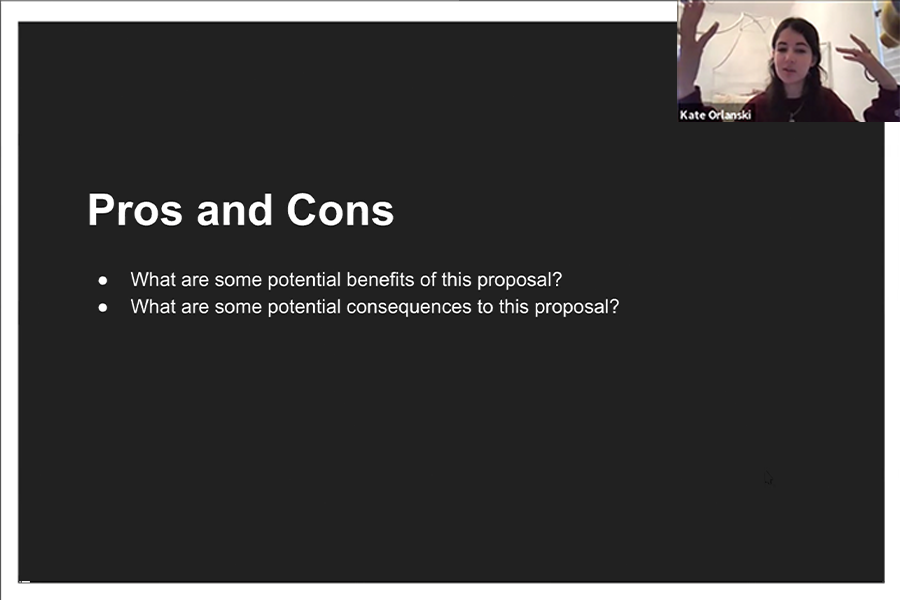Teachers must grade work within three weeks or not assign tests and projects, Town Hall votes
Vote is binding since proposal was pre-approved by student-teacher review
BP Screenshot by Ellie Orlanski
VOTE: Agenda Chair Kate Orlanski presented the “Timely Grading Proposal” at Town Hall last Friday.
April 15, 2021
Town Hall decided the very first proposal of the year April 9, voting overwhelmingly that teachers should, unless taking a leave of absence or chaperoning a school trip, grade all work or tests within three weeks of when students submit it.
If work is not graded by then, the teacher may not assign any more tests or major projects until it is, the new rule states.
The proposal was created by sophomores Eli Weiss and Evan Beller and approved by a vote of 123 – 14. The vote is binding, because before the proposal could be debated, it was approved by a joint committee of students, teachers and administration.
“I often heard about my friends having these situations where half of their assignments just were not graded,” said Evan in an interview. “They didn’t know how they were doing in the class until the end of the semester.
“It was really painful, and even I had to deal with this,” he said. “We really just want to help alleviate that problem by using the Just Community.”
At Town Hall, the proposal was presented by Agenda Chair Kate Orlanski. Many students favored it immediately, saying it would make them more focused and motivated.
Ninth-grader Sam Elyaszadeh was one of the first to speak.
“I have experienced it as a freshman, where my teacher hasn’t graded all my assignments until the last couple weeks of the semester or the last month until the semester ended,” said Sam.
“I didn’t know how well I was doing because I didn’t have the grade, and I didn’t know whether I should follow up with them or just continue to do what I was doing.”
Grades seemed to be the concern of many who spoke.
“Maintaining grades is very stressful,” said freshman Amalia Zucker. “In order to do that, I need to know exactly where I am at all times… If i don’t know where my range is between a C and an A, that turns into a problem because I need to know if I need help.”
Others said teachers should be held to deadlines as students are. Sophomore Alexandra Guetta said teachers should push themselves to help students improve.
“I feel like there is also an element of respect that has to do with a teacher not turning in an assignment or grade on time,” said Alexandra. “A teacher usually wants a student to put in a lot of effort and put in a lot of work to turn in their work and their assignment on time, so i think that that’s kind of the same concept with a teacher. ”
But senior Samson Taxon said delayed grading was not a big problem.
“Just to give some senior perspective, I don’t think I’ve ever had two ungraded tests at the same time, and I don’t ever think I’ve had three ungraded essays at the same time,” said Samson. “I think where this is going to lead to happening is your gonna have waves of grading every three weeks.”
Others said they thought it would be more beneficial for smaller assignments.
“it’s the little ones that the teachers kind of keep pushing off, and the bigger ones they grade right away,” said freshman Arielle Grossman.
Teachers also spoke in favor of the proposal, although they also mentioned potential problems. Judaic Studies teacher Dr. Sheila Keiter warned that teachers could feel rushed to grade assignments and not give the full feedback they would normally give.
“I’m for the most part in favor of this proposal,” Dr. Keiter said, “But I’m just thinking of the cons. I know that there are some assignments I want to grade with greater care, like really pulling apart the language and leaving lots of feedback. That takes longer to do.”
That comment sparked some discussion on Zoom’s chat feature. Senior Evy Rosenkrantz suggested that teachers have five weeks to grade as opposed to the three. But she did not propose amending Evan and Eli’s proposal.
Other teachers said students could file a case with the Fairness Committee if a teacher’s grading was taking too long. Students replied that that might be disrespectful or hurt their relationship with the teacher.
After Town Hall concluded, students were able to vote in favor or against the proposal on Schoology. The rule will now be added to the Student Handbook.
It was the first proposal vote of the year, and came after the Judicial Review Committee — made up of the Fairness and Agenda chairs, an elected faculty representative and the head of school — approved it for discussion. Under a constitutional amendment passed last May, that meant that any vote would be binding.
That, too, was a first. Kate Orlanski said that was easy. Rabbi David Block was there as head of school, and Rabbi Abraham Leiberman represented the faculty.
“We had a brief meeting, seven minutes long,” said Kate Orlanski.
Evan Beller said he was pleased with the result.
“I just really hope that students in the future will be able to turn in an assignment and hear feedback on it in an orderly fashion,” said Evan.















